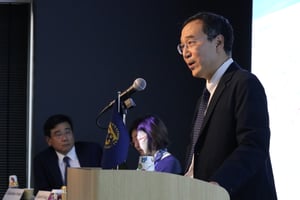News from Asia and the Pacific
Policy Recommendations to Counter China’s Slowing Growth Shared in Japan
November 11, 2019, Tokyo, Japan – Adjusting macro policies to trade shocks, strengthening the international trading system, and continuing reforms on rebalancing and de-risking are some of the policy priorities for China to counter its slowing growth, said Kenneth Kang, Deputy Director of the IMF’s Asia and Pacific Department at a public seminar in Tokyo.
 Introducing highlights of the Fund’s annual economic surveillance on China, Kang said that China’s outlook remains uncertain reflecting global trade tensions and domestic vulnerabilities. Advancing domestic reforms and resolving trade tensions will be critical to enhance China’s growth prospects and its spillover effects to the rest of the world, he added.
Introducing highlights of the Fund’s annual economic surveillance on China, Kang said that China’s outlook remains uncertain reflecting global trade tensions and domestic vulnerabilities. Advancing domestic reforms and resolving trade tensions will be critical to enhance China’s growth prospects and its spillover effects to the rest of the world, he added.
The seminar on China’s 2019 Article IV Consultation was part of the Economic Issues Seminar series held by the IMF Regional Office for Asia and the Pacific (OAP) to share the Fund’s knowledge assets widely with the public.
During the seminar, Kang presented key findings not only from the annual economic surveillance, or the so-called Article IV Consultation, concluded in August but also the latest staff forecasts issued in the October version of the World Economic Outlook (WEO). He explained that China’s growth was slowing even before the trade tensions, and the IMF projects growth will gradually slow further as a result of demographics and productivity. Therefore, he said, accelerating opening-up the market, boosting consumption and promoting state-owned enterprise reforms among others are key policy recommendations, in addition to responding to the trade tensions.
Following his presentation, Junko Koeda, Chief Economist of the Finance Ministry’s Policy Research institute, cast some comments from the analytical viewpoint focusing on China’s rebalancing and the spillover effects of the trade tensions on other countries including Japan, and posed questions about their longer-term effects. Kang responded that the Fund has also recently examined the “productivity” implications of the trade tensions that could be more relevant over the longer term due to a slower pace of technological diffusion and inefficient allocation of resources.
The seminar drew more than 80 people from the public and private sectors, including government offices, thinktanks, universities, businesses, and the media.
For the first time, the seminar introduced an online question system for the participants to enter their questions online while listening to the presentation. It allowed the participants to pose more questions than the normal Q&A sessions in the previous seminars. Some shared their concerns about China’s reliability of statistical data, its reform of state-owned enterprises, and the prospects of the housing market. Others raised the issue of the impact of the trade tensions on global supply chains and questions about China’s new debt sustainability framework for its external lending.


